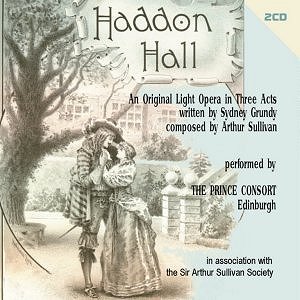ARTHUR SULLIVAN
Haddon Hall. (Written by Sydney Grundy).
 The Prince Consort, Edinburgh.
The Prince Consort, Edinburgh.
 The Divine Art 21201
(2CDs: 55' 13'' and 56'
06)
The Divine Art 21201
(2CDs: 55' 13'' and 56'
06)
Crotchet
£19.99
AmazonUK
£17.99

Written after the success of The Gondoliers, at a period when Gilbert
and Sullivan were hardly speaking to each other, Arthur Sullivan's 1892 light
opera Haddon Hall has much charm and boasts a most impressively fluent
and beguiling score. The opera is cast in no less than three acts with a
storm scene before the second Scene of Act Two and both of these ambitious
features may have militated against its success, despite the distinction
of Sullivan's contribution. Set in the days of Puritans and Royalists and
with more human interest than usual for a Savoy opera, Haddon Hall
finds Sir Arthur at his most exuberant and inventive. The opening numbers
go from Yeoman of the Guard-like pomp and ceremony to feather light
polka to poignant ballad, all advancing the story. Indeed, the music is
definitely in the foreground, the composer clearly relishing the opportunity
now afforded him of writing a narrative-driven through-composed composition
rather than a collection of set pieces. This performance of Haddon Hall
by The Prince Consort is complete but omits the spoken dialogue (which is
reproduced in the accompanying booklet).
Individual songs stand out: 'I've heard it said' and 'There's no one by'
have attractive and memorable tunes equal to the best of the earlier Savoy
operas. They are both dryly delivered and crisply articulated (not all the
items have their words as clearly enunciated). The majestic choruses are
consistently impressive inventions and there is even a brief orchestral tempest,
which starts off sounding like the build up from The Four Seasons,
and breaks into something like the storm from Beethoven's Pastoral
Symphony with manic cuckoos from the woodwind thrown in at the climax (a
disconcerting touch).
It is fascinating to hear how Sullivan's muse was not only undiminished by
collaboration with another writer, but positively inspired by the freedom
from his perceived subordination to W S Gilbert's wordplay. Unfortunately,
I found Sydney Grundy's text disappointing: at its best when avoiding comedy
and most painful when aspiring to Gilbertesque wit. The laboured humour is
represented by the characters of Roundhead Rupert Vernon and The McCrankie.
Despite the earthbound libretto, Ian Lawson gives an excellent performance
as Rupert, sounding like John Reed at his prissiest, and the production really
takes wing with his contributions. Sadly, The McCrankie, whose name is actually
funnier than any of his desperate 'Och aye the noo' dialogue, must surely
become increasingly tedious to even the most indulgent listener, sportingly
though Maxwell Smart tackles the part.
The Prince Consort are to be congratulated on giving such a spirited reading
of this neglected work. Occasionally intonation from singers and players
goes awry, mainly in the large choruses and orchestral tutti passages but
the excellence of individual contributions such as that of Ian Lawson goes
a long way to cancelling out such imperfections. According to the informative
notes, the recording was made in one day and the sense of urgency and continuity
of a live performance is enjoyably captured here. The tunes of many of the
numbers stick in the mind long after the work has finished, a testament to
the freshness of Sullivan's invention so faithfully communicated on these
discs. Recommended to Sullivan fans and those who enjoy fine melodies from
a master craftsman alike.
Paul Conway

